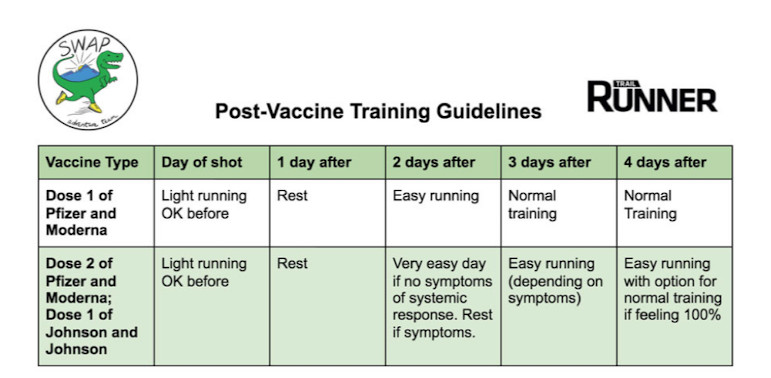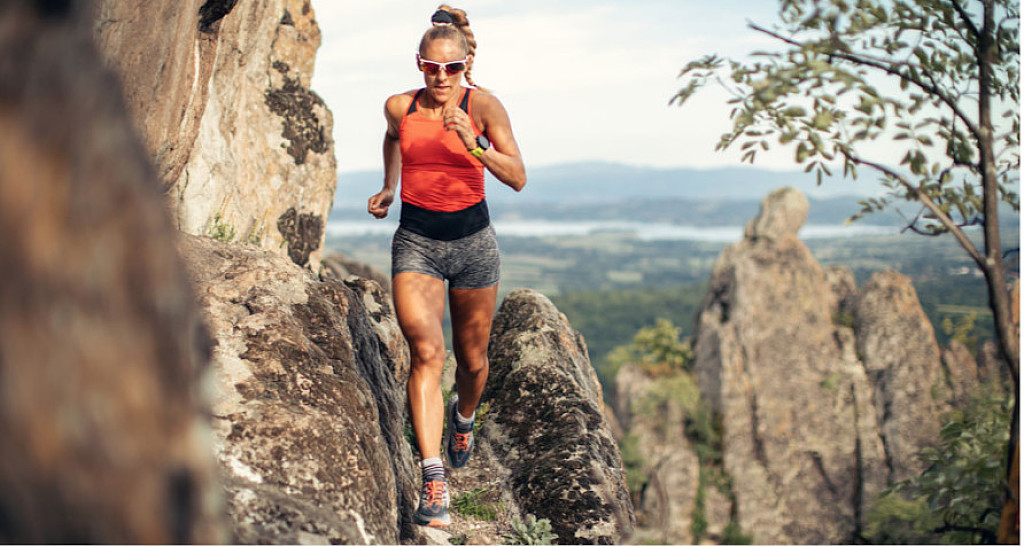Running News Daily
Running News Daily is edited by Bob Anderson. Send your news items to bob@mybestruns.com Advertising opportunities available. Train the Kenyan Way at KATA Kenya and Portugal owned and operated by Bob Anderson. Be sure to catch our movie A Long Run the movie KATA Running Camps and KATA Potato Farms - 31 now open in Kenya! https://kata.ke/
Index to Daily Posts · Sign Up For Updates · Run The World Feed
Training Guidelines After COVID-19 Vaccine Doses
Back in December, we reviewed the COVID-19 vaccines and considerations for athletes. The big conclusion: it's such an exciting time in the world with novel technology being harnessed to mobilize our immune systems with minimal risk.
Since that article, millions of people have been vaccinated, including many athletes we coach. Based on the clinical trials and lack of universal guidelines for every athlete, we advise athletes we coach to err on the side of caution with training-resting the day after each vaccine dose, even if they feel fine, before easing back into training (full guidelines at the bottom of the article and discussed in our podcast). Most importantly, listen to any directions from your doctor or personal coach.

Systemic Responses
Let's start with the great news. In the clinical trials, side effects were minimal and fleeting. For example, the New England Journal of Medicine published Phase 2 and Phase 3 trial results for the Pfizer/BioNTech vaccine that demonstrated its ground-breaking effectiveness. Reactogenicity is a kick-ass Scrabble word used to describe normal physical responses to a vaccine injection. Systemic reactogenicity was reported more often by younger participants, likely related to enhanced immune-system responses, with increased reactions after the second dose.
In determining post-vaccine training guidelines, these systemic responses are the most important. If you feel like crap, don't run. Always listen to your body. But what if you don't feel bad? The answer to that question is the crux of this article.
For the Pfizer vaccine, just over 50% of younger participants reported fatigue and headache after the second dose of the vaccine, compared to 23% of those that received a placebo. Fever was reported by 16% of younger participants after the second dose (11% of older participants), with smaller percentages reporting fever after the first dose. In these participants, fever and chills were observed in the first two days after injection, then resolved shortly thereafter. Severe fatigue was reported in 4% of those that received the vaccine, which resolved on short time scales. Anecdotally, after the first Pfizer shot, co-author David needed a lollipop and a hug.
The clinical trial data for the Moderna vaccine published in The Lancet showed similar patterns. The single-dose Johnson and Johnson vaccine uses a different DNA-based approach to cause the immune response, but shows similar rates of systemic reactogenicity, as published in the New England Journal of Medicine in January. Lollipops and/or hugs optional, but encouraged.
In determining post-vaccine training guidelines, these systemic responses are the most important. If you feel like crap, don't run. Always listen to your body. But what if you don't feel bad? The answer to that question is the crux of this article.
Immune System Responses
A Nature article published in March reviewed the modes of immune system activation from the COVID vaccines. To summarize it greatly, the vaccines encode messages to help produce the spike protein on the surface of the COVID virus, creating an immune system "memory" to prevent viral entry into the cells. The process of going from vaccine injection to immune system protection involves the creation of neutralizing antibodies and virus-specific T-cell responses (tailoring the body's immune response to the specific pathogen). The key thing for athletes to remember is that for the immune system response to work as intended, it involves the activation of multiple inflammatory mediators (cytokines, Type I interferon). In other words, inflammation is connected to immunity.
Inflammation is normal and in cases like this can actually be a key component in health and adaptation to stress. But even short of systemic reactions like fevers and fatigue, cellular-level inflammation could impact training in individually-variable ways via performance, adaptation, and injury. A February article in The Lancet highlighted the uncertainty for athletes, indicating there shouldn't be any cause for concern but also that it may "be appropriate to consider a temporary reduction in training load in the first 48-72 h post vaccine injection, particularly after the second dose."
Inflammation is normal and in cases like this can actually be a key component in health and adaptation to stress. But even short of systemic reactions like fevers and fatigue, cellular-level inflammation could impact training in individually-variable ways via performance, adaptation, and injury.
Our big concern as coaches is that athletes are so used to training through some discomfort that they may not even notice vaccine-related signals to take a bit more downtime. As athletes, we have a lot of experience with sore muscles, but not as much experience with immune responses to novel vaccines. And given individual variability, we suggest being extra cautious in the few days after each injection. It's not a question of whether you can train hard (you probably can!), but a question of whether it's necessary to train hard for a day or two.
Anecdotally, we have seen almost no performance decreases after a few days of vaccine administration. For example, Katie Asmuth won the Bandera 100K less than a week after receiving her second dose of the Pfizer vaccine. However, we have also seen unexpected fatigue and a few soft tissue injuries at relatively low training volume within a week after vaccine doses. Is that random, unconnected noise? Probably. But it underscores the importance of thinking long-term with athletic growth, since a few relaxed days will likely only help performance.
Training Guidelines
No matter what, a little bit of bonus rest can go a long way toward supporting long-term growth, independent of vaccine status. With that in mind, here are the cautious guidelines we advise for our athletes after receiving the COVID vaccine.
We also try to avoid having athletes do very hard workouts or long runs just before receiving the vaccine. And assuming no severe reactogenicity, we still try to avoid very hard workouts or races in the three full days after the first dose, and four full days after the second dose. A couple more important notes:
However, none of these rules are set in stone, even for our athletes. Always listen to your doctor and your coach. If you have already received the vaccine and applied different rules, that is wonderful and it shouldn't be a worry.
For our team, we are treating each shot almost as its own workout. And like all workouts big or small, the vaccine is a major reason for celebration.
by Trail Runner Magazine
Login to leave a comment




